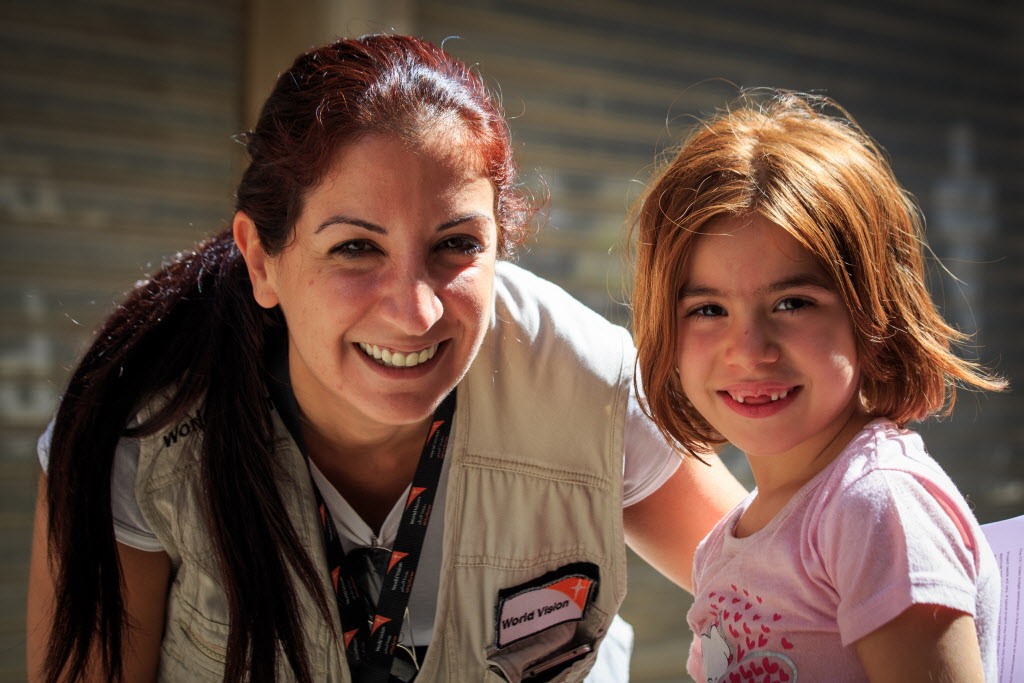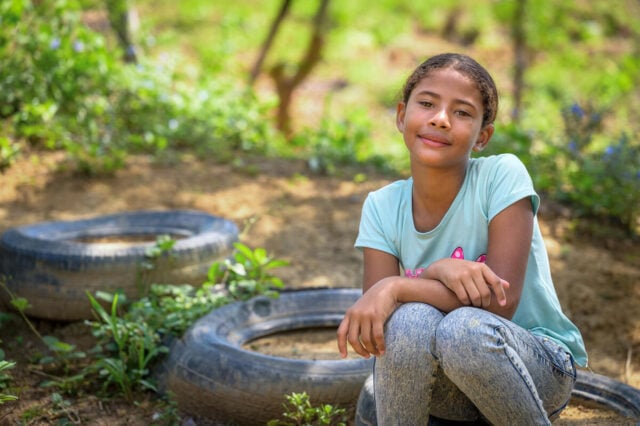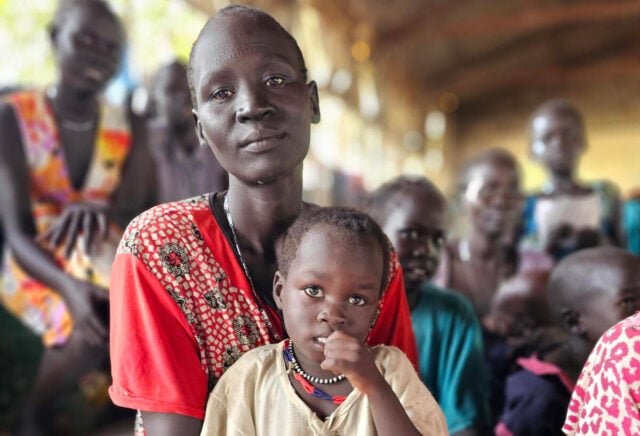“I would stand in the queue with my dad, and he would have my sister in front and me behind because then we’d be three people and entitled to three bags of bread [instead of one],” Patricia says. “Bread was not so available, so we had to make sure we had enough.”
Getting bread was also a welcomed reprieve. It allowed her to leave the underground warehouse where she and her family lived for 18 months while war raged on above ground. It also meant a couple hours of ceasefire that provided a reprieve from the sounds of bombs and gunfire — sounds that still haunt her today.
“On Canada Day, I was in Ottawa, and they had a cannon shoot 21 shots. Everyone was so happy, and I was like, ‘Come on, get it over with!’” she says, as she covers her ears at the memory. “You don’t want to live a war. It’s the most hideous thing you can ever feel.”
Patricia now works as the national communications manager for World Vision in Lebanon. Her childhood experience fuels her passion for helping children and families affected by the conflict in Syria, now in its fifth year.
The war has scattered 4 million Syrians to neighboring countries, including Lebanon, and displaced 7.6 million people within Syria.
Patricia recently spoke with us about the Syrian refugee crisis, how her team is working with refugees, and how you can help.
What’s it like doing your job?
When someone asks me about the crisis, I think about the people I’ve met. I don’t think about the crisis. I don’t see programs and figures. I see people.
You get a view of the refugees’ stories, their hearts, their minds, their eyes. When you interview a refugee family, and you leave, you leave with a piece of them. They have this hope that something will change because of you — because of World Vision.
I’m not just talking about material things. They’re always thankful we listen to them. Listening is something World Vision does very well. There’s an unspoken bond between us and them. We take it upon ourselves as a promise to help no matter what or how difficult it seems.
What has impacted you the most in talking to people?
There’s a lot, honestly. If you talk to any refugee, the word ‘God’ comes up in almost every answer: God willing. We trust in God. God is there. God sees everything. It’s inspiring because, sometimes even as staff, you start having doubts of why this happened.
We have refugees that say, ‘We don’t want to scare you. I’m not going to tell you everything because you cannot handle this, and we don’t want to burden you with this.’ They are caring.
There are refugees that fled the violence, and now they’re in a new country. [Syrian] refugees are really people like me and you and any other American who just bought a house, have their jobs, have their activities, football, kids go to school, and that’s all up in the air. There’s nothing of that normalcy in Lebanon.
Now they have to marry off their daughter because it’s fewer mouths to feed. Tomorrow, it’s a boy who has to drop out of school to go work in the field or a garage and forget about his education.
The mere fact that children are not going to school for four years now, I find it impossible for them. After four years of missing school, how can you catch up on your education? You have to go back to zero and start again — those are the children that will eventually go back to Syria and rebuild.
What type of a generation are we leaving? Even if education is not perceived as a life-threatening need, we need to tackle it now — it’s a major thing.
What’s being done in Lebanon to address the education issue among refugees living there?
For two years, we had educational centers with remedial classes of basic literacy and numeracy inside a public school or in the tented settlements. But this year, because the government decided to open the public schools in the evening and have evening shifts, the capacity of the schools is doubled. But there are a lot of exceptions.
It’s evening, so [parents] don’t wish to send their children to school because it’s dark — it’s not safe. Or they can’t afford the transportation because in some places, from your tent to the center, it’s a 20-minute ride. The bus would be $50 a month. They can barely afford to buy their food, let alone pay for the transportation.
After the government opened the schools, they asked all humanitarian organizations to stop educational centers, so we stopped. We kept our early childhood educational centers, and now we’re building a case for all the children who aren’t going to public schools for legitimate reasons [to attend].
What were those educational centers like?
You have literally a tent, about 10 feet by 15 feet. When you ask [the children] about their school in Syria, they’ll tell you it’s a big brick school. This is a tent equipped with plastic tables and chairs and a chalkboard that stands by itself.
About half of the teachers are Syrians because we hire teachers locally from the community. Children learn five things: English, Arabic, math, sciences, and a fifth component — psychosocial support.
But the educational centers currently aren’t happening — you can’t go against the government.
What are children doing instead of attending school?
If they’re not going to school, that means they’re working. More and more so, they don’t have an option not to.
This summer, a boy I met worked in the library and a charcoal shop. He was taking those books, reading them, and returning them the next day. He said, ‘I don’t want everything to go to waste.’ Another boy was reading the Quran — it was the only book he had. At least he’s reading Arabic, he says.
What scares me is when you start working and earning money at an early age, it’s very difficult to leave and go back to school later on. You think you’ve grown up, and you’re the man of the house because you’re providing money to the family.
With so much need, how can we pray?
After four years, pray for the staff to not be demotivated. We’re not seeing that this war is going to end anytime soon. It grows on you. For some, you become detached. Some become demotivated. Some become depressed. Some become mechanical. Some become impatient. Nothing is changing. The need is still there. It’s increasing, if anything. The funding is decreasing, and the need is going up.
The Lebanese have been very welcoming to this crisis at the beginning, but after four years, it’s become a huge burden. There is the poverty line, and people were living below it, and you have people who were just barely above it who have now dropped below it because of the pressure put on society, the infrastructure, and all the services [by the influx of Syrian refugees]. It’s like the whole state of Washington moving to Canada — how would Canadians feel? How would you feel? We are at a critical crossroads.
We can’t keep doing the relief work forever. At some point, something needs to be done. Pray for an end to the war in Syria. That’s what we really need to pray for — a peaceful solution in Syria. They all dream about going back.
Someone I met in Lebanon, when they left Syria, they put these marble balls under the ground to recognize the location [of their home]. They wanted to keep a landmark because they knew that by time they go back, all the houses will be destroyed. I’m not sure how they can find the marble balls, but that’s the mindset — they care about their house; they care about where they belong. I bought marble balls and have them in my office [as a reminder].
Learn more
- Read our FAQs about the conflict in Syria, its humanitarian impact, and how World Vision is responding to the immense need.
How you can help
- As Patricia mentioned, pray for humanitarian staff and an end to the war. Pray for those struggling in poverty to get help and for more funds to be raised to help people.
- Make a one-time donation or give monthly to support World Vision’s response to the Syria refugee crisis. Your donation or monthly pledge will help provide for basic needs like food, water, and shelter for refugees in need.




